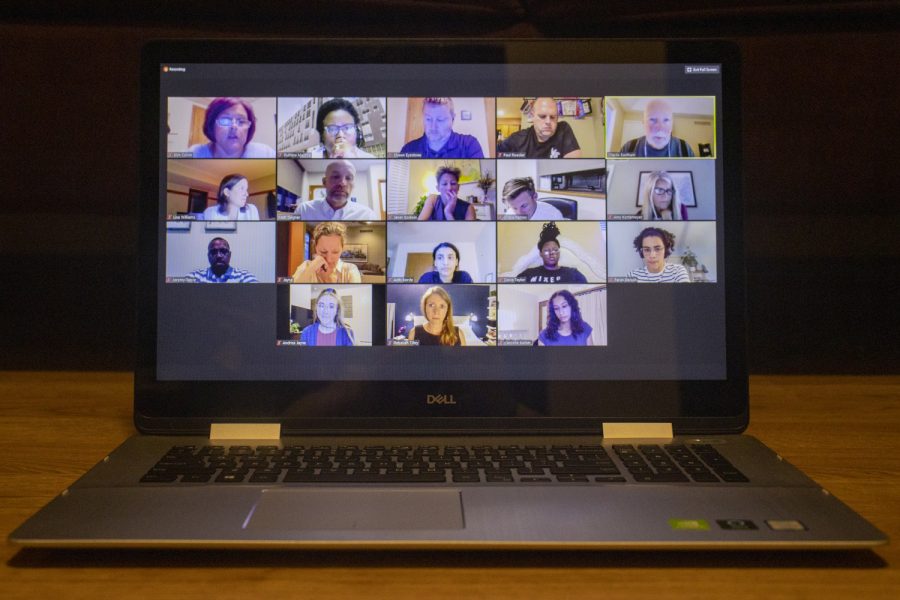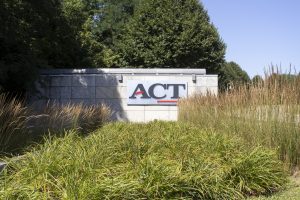Iowa City school board outlines potential policies for racial equity
In a work session Tuesday, the Iowa City Community School District Equity Committee met with the school board to discuss recommendations aimed at addressing racism and racial disparities in the district.
The ICCSD School Board meets with members of the ICCSD Equity Committee over Zoom on Tuesday, July 28, 2020. Attendees discussed issues including the disproportionality of suspensions for minority students and what work needs to be done to improve curriculum and the procedures within the school district.
July 28, 2020
The Iowa City Community School District will consider limiting when police are allowed on campus, changing discipline protocol, and implementing several other measures focused on combating racial inequities in the district.
The school board met with members of the district’s Equity Committee in a work session on Tuesday evening to discuss action the board can take to meet the demands of the Iowa Freedom Riders and make the schools’ environment more inclusive.
The Iowa Freedom Riders, who led protests in Iowa City throughout June, have made several demands of the school board. Members of the group spoke with the board in early July about how best to respond to the demands.
The Equity Committee brought a list of recommendations to the board to address the demands broken up into several categories — police presence, discipline, curriculum, mental and emotional health, personnel, and community engagement.
The Equity Committee recommended that the board pass policies to limit the presence of surrounding community police officers on school campuses and outline specific parameters for when officers can be requested on campus.
RELATED: Teachers and leaders within Iowa City schools address racial injustice in lower education
Rebekah Tilley, a member of the Equity Committee, said many parents told the committee they had seen police patrolling near the campus, and she said it can be alienating for some students.
The board has voted in the past to defund school resource officers, but law enforcement officers can still be called onto campus by staff.
“We know that some schools have had a much greater police presence than others,” she said. “And we understand from listening to our community members, that can be — for certain members of our community — very traumatic, and not something that makes the school environment feel welcome.”
Board members added that they plan to make changes to and publicize the discipline, policies, and procedures binder — the handbook that dictates the protocol for disciplining students.
Members of the Equity Committee pointed out that students of color, especially Black students, in the district are disciplined at a much higher rate than white students. City High’s student newspaper, the Little Hawk, reported in December 2019 that Black students were more than five times as likely to be suspended as white students in the district.
“When they made [the discipline, policies, and procedures binder], it was based on the previous year’s office referrals, which means that it’s based in racism and bias in those referrals,” said Caroline Barker, a student and member of the Equity Committee. “And I could be speculating about the DPP, but I think there’s some racism in it, and if it was public we could fix those practices.”
Multiple board members agreed that the current discipline, policies, and procedures binder has racial biases written into the protocol, and addressing racial disparities in discipline would require revisiting and changing discipline protocols. The board agreed the protocols should be made public.
“Some of the problematic stuff in there really has to do with the language that’s used, it’s just racist language and not very culturally competent,” said board member JP Claussen. “And if we could just get something public, I think people would notice those things.”
The Equity Committee recommended introducing antiracist curriculum at every grade level, which is also one of the demands of the Iowa Freedom Riders.
Claussen said effective antiracist teaching would require a culture shift in the district. He said it may be difficult to buy all new curriculum immediately, but teachers can commit to teaching antiracist content in and outside class.
“The other problem I think with that is it compartmentalizes antiracism and says, ‘Well, that’s a social study issue,’” he said. “And really, it’s a culture issue. It should be diffused throughout.”
In regard to mental and emotional health, Superintendent Matt Degner said the district plans to implement social-emotional learning curricula in the coming year — classes that focus on improving social and emotional competencies in students.
Other recommendations from the Equity Committee included conducting exit interviews with staff members of color who leave the district, creating strategies for hiring teachers of color, expanding cultural competency training, and creating a racial equity policy similar to the school’s LGBTQ equity policy.
The board did not take any action during the work session Tuesday night, but members said they would discuss the next steps at a board retreat next weekend, and address some of the policy changes in upcoming meetings.






